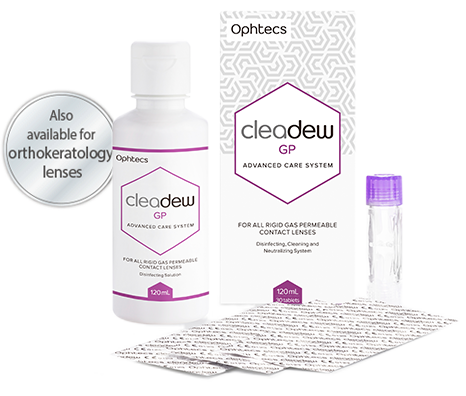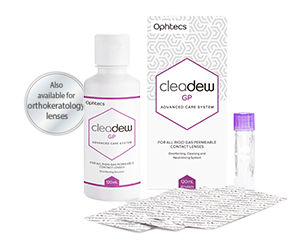
ADVANCED CARE SYSTEM FOR ALL Rigid Gas Permeable (RGP) CONTACT LENSES
Povidone-iodine based disinfectant for RGP lenses
Povidone iodine is included in the product.
“Povidone iodine” is a very safe disinfectant which is widely used in eye drops and disinfectants for ophthalmic operations.
One-step, speedy care for daily routine
Simple procedure
Simple care requires only setting the contact lenses in the storage case and putting a neutralization tablet and liquid agent in the case. Visual check of completed disinfectio promotes correct and easy daily care performance for everyone.
Available for all RGP lenses
Available also for orthokeratology lenses
cleadew GP can be used safely because the compatibility test for orthokeratology lenses* has been conducted.
* For lenses approved and sold in Japan domestic market
Lens case
Be sure to use the cross type lens case in which a neutralization tablet can be retained at the center. Avoid using the separate type lens case with a partition (double-cell structure) or the full penetration type lens case in which a neutralization tablet cannot be retained.
For orthokeratology lenses, please use cleadew GP with their specified lens cases.
Why is “Disinfection”required for RGP lenses?
Even users of hard contact lenses can develop infections.
In recent years, infections in users of contact lenses have been acknowledged as a problem, and even people wearing hard contact lenses are known to develop infections. As for hard contact lenses, however, disinfection is not required and use of tap water is also permitted.
Contact lenses used by patients with corneal infection
Infective keratitis national surveillance study group: National surveillance of infective keratitis – Bacterial isolate / patient background / current state of treatment – Journal of Japanese Ophthalmological Society: 110:961-972.2006
Possibilities of infection caused by contamination of lens case
The lens case for RGP lenses is apt to be used for a long time, and the shape may be complicated. Hence, bacteria in the case feed on contaminants such as protein deposits and thus proliferate. In addition, bacteria adhering to the case are disinfectant resistant, and may transfer to contact lenses, causing ocular infections.
Why is “Disinfection”required for hard contact lenses?
Even users of hard contact lenses can develop infections.
In recent years, infections in users of contact lenses have been acknowledged as a problem, and even people wearing hard contact lenses are known to develop infections. As for hard contact lenses, however, disinfection is not required and use of tap water is also permitted.
Contact lenses used by patients with corneal infection
Infective keratitis national surveillance study group: National surveillance of infective keratitis – Bacterial isolate / patient background / current state of treatment – Journal of Japanese Ophthalmological Society: 110:961-972.2006
Possibilities of infection caused by contamination of lens case
The lens case for RGP lenses is apt to be used for a long time, and the shape may be complicated. Hence, bacteria in the case feed on contaminants such as protein deposits and thus proliferate. In addition, bacteria adhering to the case are disinfectant resistant, and may transfer to contact lenses, causing ocular infections.
Proper care is needed to protect RGP lenses and the cases from deposits and microorganisms
We propose a care solution involving disinfection plus cleaning for all RGP contact lenses!

Povidone iodine
Substantially disinfects
bacteria and acanthamoeba
cleadew GP includes a disinfectant, povidone iodine which penetrates the biofilm made of bacteria adhering to the case, and can effectively eliminate the bacteria which cause infection.
Cleans contaminants
with proteolytic enzyme at each use of contact lenses.
Proteolytic enzyme and surfactant contained in cleadew GP effectively remove deposits comprised of protein and lipids adhering to lenses. cleadew GP is also suitable for orthokeratology lenses with complicated shapes.
 Japanese
Japanese




